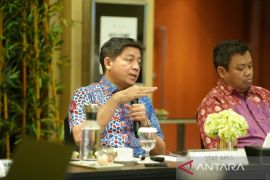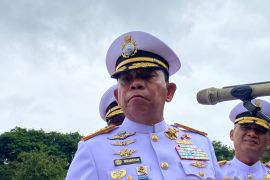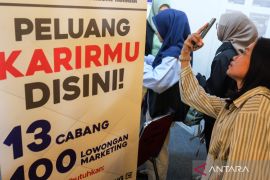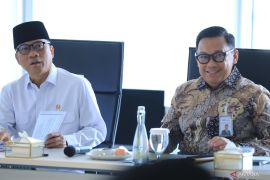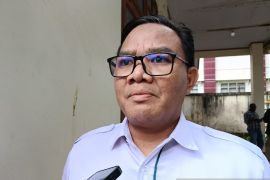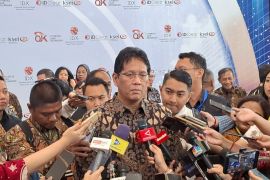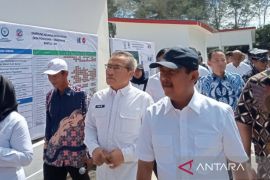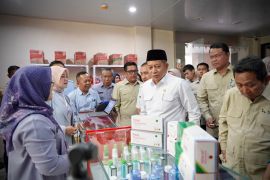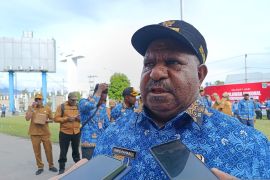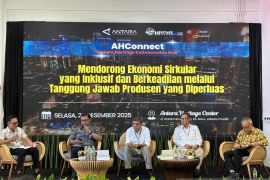In villages, farmers are under huge pressure induced by climate change. The South Sulawesi Office of the Meteorology, Climatology, and Geophysics Agency (BMKG) has projected La Nina phenomenon to occur until 2025.
South Sulawesi BMKG Head Ayi Sudrajat noted that the condition will cause an increase in rainfall, which is higher than normal.
This condition could potentially cause flooding that damages agricultural land and threatens national food production, especially rice.
The production of rice, which makes up 30 percent of domestic food needs, can decline significantly if the impacts of climate change are not anticipated promptly.
Indonesia's dependence on food imports could also be another major threat to the country's food security.
Based on Statistics Indonesia (BPS) data, Indonesia was recorded to have imported 3.48 million tons of rice as of October 2024.
Countries that are sources of Indonesia's rice imports are Thailand, Vietnam, Myanmar, Pakistan, and Cambodia.
Indonesia's rice imports in 2024 are projected to reach 5.17 million tons, which has the potential to be the country's largest rice import record. This does not include other imported food commodities such as wheat, corn, and sugar.
On the other hand, in urban areas, such as Yogyakarta, digital transformation has opened up huge opportunities for young entrepreneurs, yet technological infrastructure challenges remain a barrier.
The latest survey of the Indonesian Internet Service Providers Association (APJII) revealed that in 2024, some 82.6 percent of residents in underdeveloped regions in Indonesia were connected to the internet.
A study by Google and Temasek noted that by being connected to digital platforms, micro, small, and medium enterprises (MSMEs) can increase revenue by up to 26 percent.
Indonesia's digital economic potential, projected to reach US$146 billion in 2025, is at risk of not being optimal if the gap in internet access is not addressed immediately.
Development of the New Capital City Nusantara (IKN) is one of the largest strategic projects in Indonesia's history.
With an investment target of Rp466 trillion (around USD29.29 billion), of which 80 percent is expected to come from the private sector, this project is expected to spur equitable development.
However, Finance Minister Sri Mulyani Indrawati noted that the state budget deficit of Rp309.2 trillion (around USD19.43 billion) as of October 2024 raised concerns about resource allocation priorities.
This ambitious project must be managed with high-level transparency to address public concerns.
Numerous studies have shown that well-managed and planned infrastructure projects can significantly boost economic growth. Thus, if implemented effectively, the IKN project is a good opportunity for Indonesia.
In the energy sector, Indonesia still relies on coal as its main source of export revenue, reaching USD45 billion in 2022.
However, this dependence is at odds with the country's commitment to achieving net-zero emissions by 2060.
Currently, Indonesia's renewable energy sector lags significantly behind its regional neighbors, with just 12 percent of its energy derived from sustainable sources. According to BPS data, the renewable energy mix in 2022 was recorded at 12.30 percent.
In comparison, some neighboring countries have a higher share of renewable energy in their energy mix. For instance, Vietnam has a renewable energy-based power generation capacity of 45,327 MW, making it the largest in ASEAN.
Meanwhile, Indonesia's renewable energy potential, which, according to the Ministry of Energy and Mineral Resources, reaches 442 GW, needs to be utilized immediately through investment in clean energy technology and reform of fossil fuel subsidies.
With the right strategy, sources, such as solar, wind, and bioenergy, can be used to meet domestic needs while supporting the transition to sustainability.
Amid technological advancement, challenges in the employment sector remain a concern.
The open unemployment rate declined to 5.86 percent in August 2023. However, the mismatch between workforce skills and industry needs remains a significant challenge.
A University of Indonesia Demographic Institute report revealed that in 2015, the educational misalignment was widespread: vertical mismatch, which represents the disparity between education degree level and actual job, was 53.33 percent, while horizontal mismatch, indicating the divergence between the field of study and employment, stood at 60.52 percent.
This condition reflects the structural unemployment phenomenon, which hampers the competitiveness of the Indonesian workforce.
To tackle this challenge, reform in the education system is key, with emphasis on skill-based curricula and retraining programs for workers affected by automation.
Strategic solutions
Amid those various challenges, strategic solutions become an urgent need. Food security can be strengthened with modern agricultural technology such as smart irrigation and drones for monitoring.
Local food diversification, such as using sago, sorghum, and cassava, can also reduce Indonesia's dependence on imports.
In the digital sector, the government and the private sector need to synergize in investing in technology infrastructure, especially for rural areas that still lack internet access.
Digital training for MSMEs must also be increased to open wider opportunities for small businesses.
In managing strategic projects, such as the new capital project, the public-private partnership approach can be a solution to reduce the government's fiscal burden while ensuring the project's continuity.
In the energy sector, advancing the shift towards renewable energy demands strategic tax incentives for green energy projects and reform of existing fossil fuel subsidy structures.
This step must be taken with a big investment in clean technology such as solar panels and wind power.
Educational reform is also a priority to address the needs of workers in the digital era. Curriculum relevant to the needs of industries and reskilling and upskilling programs are essential to ensure that the Indonesian workforce remains competitive.
The year 2025 is an important momentum for Indonesia to rearrange its economic strategy.
Adaptive, inclusive, and future-oriented policies are key in addressing global challenges that are increasingly more complex.
Indonesia's economic journey is not merely about pursuing a growth rate but also about realizing development that can impact all community levels.
With a strong commitment and the right strategic steps, Indonesia has a big opportunity to become a robust, sustainable, and inclusive economy.
Today's challenges are a stepping stone towards a brighter future, where every citizen of Indonesia can feel the benefits of economic development that is managed wisely.
Related news: Government reaffirms commitment to strengthening food security system
Related news: Food diversification for national food security
Editor: Rahmad Nasution
Copyright © ANTARA 2024

